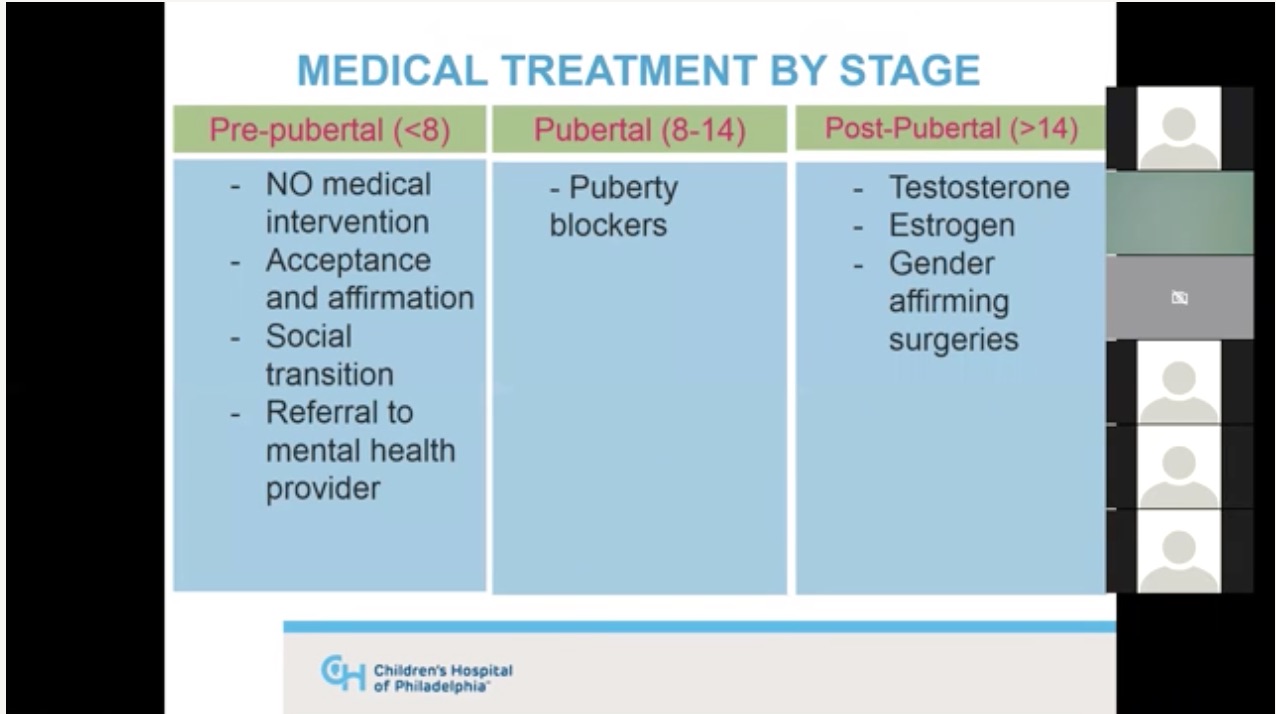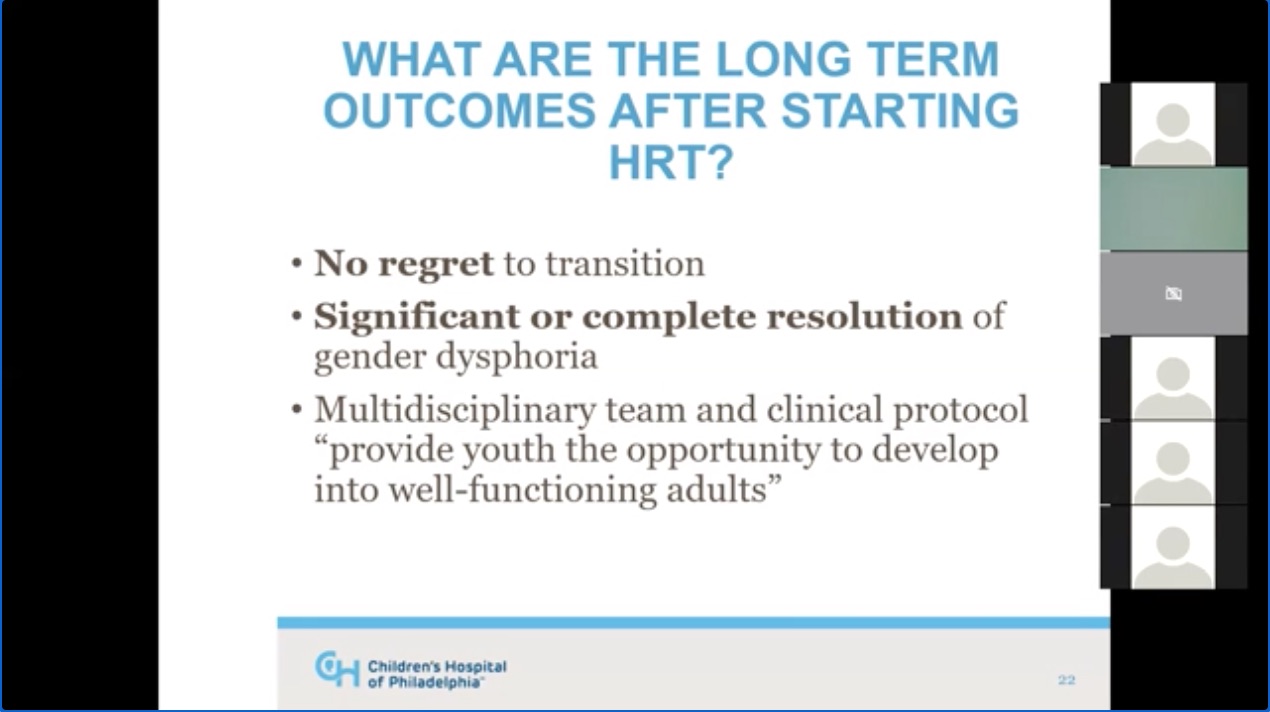Culture and Social Issues
‘Age Is A Number’: Gender Clinic Offered Puberty Blockers To Kids As Young As 8, Surgery Referrals At 14, Records Show
No featured image available
- The Children’s Hospital of Pennsylvania (CHOP) Gender and Sexuality Development Program offers medical interventions to children as young as eight as part of the medical transition process, according to documents reviewed by the Daily Caller News Foundation.
- Clinic employees have publicly advocated for certain cross-sex surgeries for minors, along with hormones and puberty blockers, and have downplayed the seriousness of the infertility which is a known consequence of some of these interventions.
- “I think it’s really important to remember that age is a number,” clinic co-founder Dr. Linda Hawkins said. “But as an adolescent medicine and developmental specialist, we know that where a child is cognitively and socially is more important than that exact number of their age.”
The Gender and Sexuality Development Program at the Children’s Hospital of Philadelphia (CHOP) offers drastic medical interventions as part of the gender transition process to children as young as eight, according to statements and documents reviewed by the Daily Caller News Foundation.
The clinic has referred children as young as 14 for “top surgery,” a euphemism for mastectomies or breast construction, though most referrals are for patients aged 16-18, Dowshen told lawmakers at a Pennsylvania House of Representatives Health Committee hearing in 2020.
The clinic’s co-founders, Dr. Linda Hawkins and Dr. Nadia Dowshen, advocated for “top surgery” for minors in a 2021 paper published in Pediatrics, the medical journal of the American Academy of Pediatrics.
“We observed consensus that chest dysphoria is a major source of distress and can be functionally disabling to transmasculine youth. MCS performed during adolescence, including before age 18, can alleviate suffering and improve functioning,” they wrote in their paper.
The clinic worked to secure surgical referrals for minors and even employed a social worker who served as a “surgery advocate,” collecting letters of support on behalf of gender dysphoric minors in order to persuade insurance companies to cover their surgeries, according to a 2021 report from CHOP. A staffer had previously pushed for such a position to be funded with the help of then-acting secretary of health for the state, Rachel Levine, and argued that the position would yield a high return on investment.
“I think it’s really important to remember that age is a number,” she said at the hearing. “But as an adolescent medicine and developmental specialist, we know that where a child is cognitively and socially is more important than that exact number of their age.”
CHOP professionals laid out the gender clinic’s guidelines for sex change procedures in a webinar on the clinic’s standards of care, which the hospital created in partnership with the Pennsylvania Department of Human Services and the DCNF obtained through a public records request.
The clinic advised “affirmation” of a child’s gender identity and social transition to the opposite sex for kids under the age of eight, who are too young for medical interventions under the clinic’s guidelines.
For medical interventions, patients must experience long-lasting gender nonconformity, which emerged or worsened at the onset of puberty, and have any coexisting medical, social and psychological issues addressed prior to the onset of medical treatment, according to the webinar.
Dr. Zachary McClain, webinar host and former adolescent specialty provider at CHOP, claimed there was “no regret” among patients who undergo cross-sex hormones during his webinar lecture.
“What are the long-term outcomes after starting hormone replacement therapy?” he said. “These are all really great. No regret to transition. Despite some of the lay press that’s out there, the medical literature does not support that at all.” He also claimed hormones resulted in “significant or complete resolution of gender dysphoria.”
It’s impossible to gather long-term data on regret rates for individuals who underwent hormones and other procedures in recent years amid the massive surge in transgender identification and the explosive growth of transgender clinics, since most of those patients are only a few years into their medical journeys. But numerous detransitioners have come forward to express regret over undergoing cross-sex procedures in their youth, including hormones.
The clinic prescribes puberty blockers after the onset of puberty, which the webinar says can occur in children as young as eight. Dowshen also stated that children were placed on blockers as young as age eight or nine in her testimony to state lawmakers.
“For kids who are going through puberty at normal ages, that could start as early as 8 or 9 … we’re making a decision to start the blocker based on when that child hits puberty,” she said. “We have a series of tests that we do, as well as the main thing being our physical exam to understand when a child is starting to have, for example, testicular development or breast development to clue us in to when they’re starting puberty. And we would start the puberty-blocking medications at that time.”
“We look to a few organizations to guide us in medical care for the youth,” McClain said in the webinar, explaining that CHOP’s guidelines follow standards of care developed by the World Professional Association for Transgender Health (WPATH), the Endocrine Society and the UCSF Center for Transgender Excellence. “There are currently no medical interventions recommended prior to the onset of puberty. That brings us to our second block, which is pubertal or eight to 14 years old. And the eligibility … to start [pubertal] suppression is they must have been diagnosed with gender dysphoria and have started puberty.”
The use of puberty blockers as part of the gender exploration process is an off-label use of a prescription drug developed to delay premature puberty in young children; it’s been linked to serious health problems, and some experts have arguedthat blockers can cement a transgender phase that most children would otherwise outgrow.
“The benefits are that it can delay irreversible secondary sex characteristics,” Dowshen told an audience during a 2018 lecture at a women’s health seminar series hosted by the National Institutes of Health (NIH). “The other benefits of the blockers are that they are fully reversible, and this allows some time for the young person to mature and be ready to make decisions that may be more irreversible.”
The irreversibility of puberty blockers has been called into question by numerous experts, including 31 psychologists, neuroscientists and hormone experts who urged further study on the drugs in a 2020 paper that concluded “the full consequences (both beneficial and adverse) of suppressing endogenous puberty are not yet understood.”
Puberty blockers cost up to $49,000 for an 18-month implant, and insurance covers it about 72% of the time, according to the webinar. McClain acknowledged that the drug is not FDA-approved for use in kids with gender dysphoria and that it is not associated with a decrease in gender dysphoria — the sense of deep discomfort with one’s body that drives some individuals to transition to the opposite sex.
The CHOP webinar recommended the administration of cross-sex hormones and “gender affirming surgeries” in the post-pubertal phase of development, which it defines as occurring at age 14 and up. For natal females, taking testosterone is tied to clitoral enlargement, severe acne, insulin resistance and an increased risk of heart disease and cancer, while for natal males, estrogen causes lower libido and increased risk of blood clots, according to the CHOP webinar; both can cause infertility and emotional changes.
Dowshen acknowledged the fertility risks associated with these drugs to the Pennsylvania House of Representatives Health Committee in 2020, but downplayed concerns about patients being unable to start families after undergoing cross-sex procedures as children.
“Questions about fertility, these are important ones that we discuss with patients and families early on and often,” she said. “What’s interesting is that the field of assisted reproductive technology is rapidly evolving and our understanding of the impacts of these medications on biological fertility are also evolving.”
“I also want to take a step back for a second to say that … there are other ways to build families beyond having a child biologically. Folks can adopt as well, and many transgender children and adolescents are interested in having biological children and many are not interested in having children at all or are interested in adopting,” she said.
Dowshen, Hawkins, McClain and the CHOP gender clinic did not respond to the DCNF’s requests for comment.
All content created by the Daily Caller News Foundation, an independent and nonpartisan newswire service, is available without charge to any legitimate news publisher that can provide a large audience. All republished articles must include our logo, our reporter’s byline and their DCNF affiliation. For any questions about our guidelines or partnering with us, please contact [email protected].



